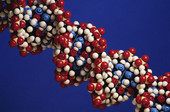
THURSDAY, Oct. 7 (HealthDay News) — Variations in a gene for an enzyme involved in cell energy metabolism may increase the risk of prostate cancer, say scientists.
These genetic variations impair the enzyme phosphodiesterase 11A (PDE11A), which helps regulate cells’ responses to hormones and other signals, according to the U.S. National Institute of Child Health and Human Development researchers and colleagues.
They compared tissue from 50 prostate cancer patients and 287 men without the disease and identified eight variations in the PDE11A gene that decreased the production or activity of PDE11A. Thirty percent of prostate cancer patients had one or more of these gene variations, compared with 10 percent of men without prostate cancer.
The study appears online in the journal Clinical Endocrinology and Metabolism.
“Our study indicates that PDE11A one day may have a place in genetic screening for predisposition to prostate cancer,” senior author Dr. Constantine Stratakis, acting director of the Intramural Research Program at the NICHD, said in an agency news release.
Previous research has linked genetic variations that inactivate PDE11A with increased risk for testicular cancer and adrenal tumors.
It’s known that the erectile dysfunction drug tadalafil (Cialis) inhibits PDE11A, but there is no current clinical evidence linking the drug to prostate cancer or other cancers, said the researchers. They called for studies to examine whether tadalafil or any other drugs might affect the prostate in men with variations in the PDE11A gene, but noted that no clinical data has linked tadalafil with cancer.
More information
The American Cancer Society has more about prostate cancer.

